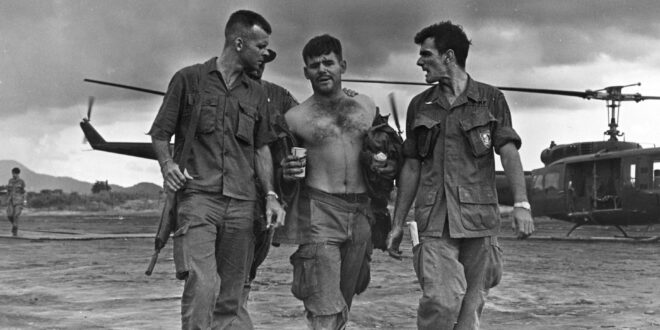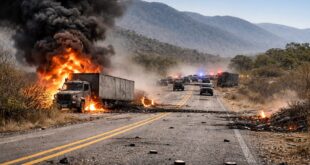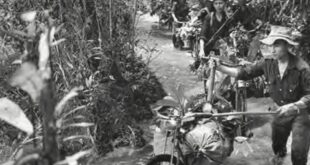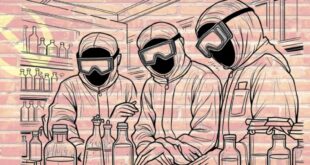Rose dragged the wounded Soldier back to the company with one hand while engaging the enemy with his weapon in the other hand.
In the spring of 1970, the U.S. Army’s Sergeant Gary Rose, a combat medic, was assigned to the legendary MACV-SOG as part of 5th Special Forces Group. Within six months, he would emerge from a secret mission, having saved lives while isolated and under intense enemy fire – while he himself was wounded. This is his story.
Rose and his team went into Laos in September as part of the secret Operation Tailwind. The mission was designed to prevent the North Vietnamese Army from funneling weapons to their own forces through Laos, along the Ho Chi Minh trail. Others in the group included indigenous Montagnard tribesmen. They went in via helicopter on Sept. 11.
Once on the ground, the group moved deep into enemy territory, and soon made contact with an enemy squad. Two Americans and two Montagnards were wounded. One of the wounded was trapped outside the company defensive perimeter. Rose, engaging the enemy, rushed to get the wounded soldier. Rose stabilized him, and carried the man through heavy gunfire back to the company defensive area.
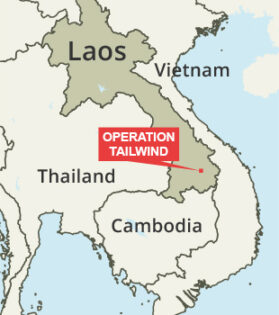
Map depicting the insertion point.
When the enemy withdrew, the company continued deeper into enemy territory. They encountered more enemy forces, and took more casualties. Rose moved through the enemy fire to render lifesaving medical treatment, personally engaging the enemy in order to get to the wounded men.
The fire becoming so intense, Rose had to crawl from position to position to treat the wounded. Over the next few days, the unit marched west and deeper into the Laos jungle, defending against continuous attacks from squad to company-sized enemy elements. Air Force gunships overhead provided close-air support to keep the enemy at bay.
Rose received the most severe of many wounds on the second day of the mission.
During an assault by a company-sized element of North Vietnamese Army, one of the Montagnards was wounded 40 to 50 meters outside the company area. Rose ran, crawled, and maneuvered his way to this wounded man, shielding the Soldier with his own body, as he rendered lifesaving medical treatment. Rose then dragged the wounded Soldier back to the company with one hand while holding back and engaging the enemy with his weapon in the other hand.
“I got a hole blown through my foot about the size of my thumb.” – Retired Capt. Gary M. Rose
Rose was returning to the company area with the wounded Soldier when a rocket propelled grenade landed nearby, spraying Rose with shrapnel in his back and leg, and severely crippling his foot. Using a stick as a crutch, as he would for the remainder of the mission, Rose continued professionally treating the wounded while ignoring his own painful wounds.
The company had taken so many wounded that a medevac helicopter was called. The helicopter was unable to land in the small opening where the company sought cover, and Rose, standing and fully exposed to the withering enemy fire, attempted to pass the wounded up to the crew on the hovering helicopter. So intense was the enemy fire, the medevac pilot aborted the mission, and the severely damaged helicopter crashed a few miles away.
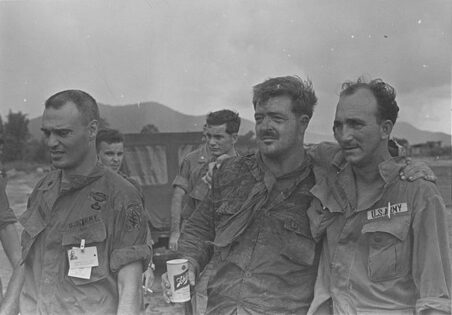
Capt. Eugene C. McCarley (center), commander of B-company, and other members of Sgt. Gary M. Rose’s unit after Operation Tailwind, Sept. 14, 1970. Photo courtesy of Gary M. Rose.
Using close air support, the company was able to break out of their defensive position. Rose improvised litters for the wounded, which now numbered over half the company. Despite his own painful and debilitating wounds, Rose never took time to eat, rest, or care for his own wounds while treating his fellow Soldiers.
On the last night of the mission, the company was surrounded in their position. Rose worked tirelessly to dig trenches for the wounded and treat their injuries. The NVA bombarded the company all night with rockets, grenades and mortars. All night, Rose exposed himself to the enemy fire, courageously moving from position to position, encouraging the Soldiers and treating the numerous wounded.
On the last day of the mission, after destroying an enemy base camp, the company was notified by the forward air controller that over 500 NVA were moving on their position. The company was ordered to a helicopter extraction point as Air Force assets cleared their path, guiding the company to the next landing zone. Setting a perimeter around the LZ while each platoon was loaded up, the enemy assaulted them from 360 degrees.
The NVA, close on the heels of the company at the landing zone, caused even more casualties among the allied personnel. Rose moved under intense enemy fire of the assaulting NVA, completely exposing himself, to retrieve the allied dead and wounded and return them to the company defensive perimeter. In great pain, Rose continued to retrieve and medically treat Soldier after Soldier, under the withering enemy fire with no regard to his own safety.
With the arrival of the extraction helicopters, Rose returned to the outer defensive perimeter to engage the enemy and repel the continued and determined enemy assault.
Rose boarded the final extraction helicopter while delivering accurate aimed fire on the enemy as he hobbled up to the loading ramp. Numerous NVA soldiers were now overrunning the vacated landing zone, an estimated 50 meters from the aircraft
Shortly after the helicopter lifted off, it was hit by enemy anti-aircraft rounds. At about 4,500 feet in the air, Rose heard the engine stop. Rose was alerted that a Marine door gunner on the extraction helicopter had been shot with an enemy round through his neck. Rose rushed to his aid, rendering lifesaving medical treatment that saved the Marine’s life before the helicopter crashed, several kilometers away from the initial extraction point.
“I remember sitting on the tailgate and all of a sudden the helicopter went quiet … We’re going to crash”
Rose was thrown from the helicopter before the point of impact.
With the Soldiers on board wounded from the crash, the helicopter was smoking and leaking fuel. Still dazed and wounded from the crash, Rose crawled back into the downed helicopter to pull his wounded and unconscious teammates from the wreckage, knowing it could explode at any moment. Rose continued to professionally administer medical treatment to the injured personnel until another helicopter arrived on the scene to extract the men.
On return to base, Rose, covered in blood and wounds, refused all treatment until the other wounded men were attended to first.
Three men died during the four days of almost constant contact with a superior enemy force deep in enemy territory. Rose is credited with treating 60-70 wounded personnel and saving many lives.
For his actions that day, he received the the Medal of Honor during a ceremony at the White House on Oct. 23, 2017.
“To Mike and all the service members who fought in the battle: You’ve earned the eternal gratitude of the entire American nation,” President Donald Trump said during the ceremony. “You faced down the evils of communism, you defended our flag, and you showed the world the unbreakable resolve of the American armed forces. Thank you.”
– Based on a U.S. Army story.
 Soldier of Fortune Magazine The Journal of Professional Adventurers
Soldier of Fortune Magazine The Journal of Professional Adventurers


